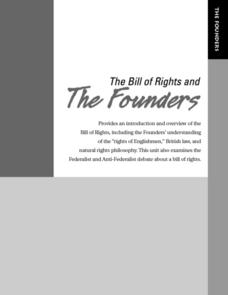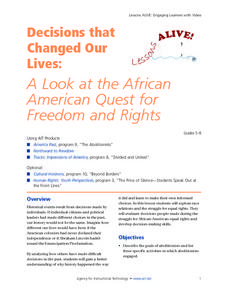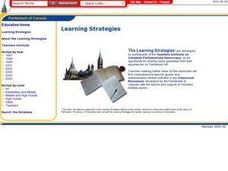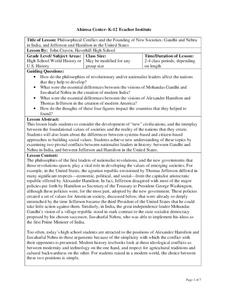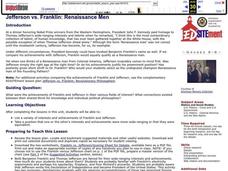PBS
Making Change: Revolutionary Tactics of the Civil Rights Movement
The film American Revolutionary: The Evolution of Grace Lee Boggs introduces viewers to the differing philosophies of and strategies employed by 1960s civil rights leaders such as Malcolm X and Martin Luther King, Jr. and the debate over...
Stanford University
Martin Luther King, Jr. and Malcolm X: A Common Solution?
Much has been made of the differences between Martin Luther King, Jr. and Malcolm X. But was there any common ground between them? Class members reconsider what they think they know about these two civil rights leaders with...
Curated OER
The Bill of Rights and the Founders
Students explain similarities between historical statements of rights and their modern applications, explore ideas of "Rights of Englishmen" and natural rights, discuss evolution of concept of rights and its impact on Bill of Rights,...
Curated OER
The Presidential Campaign Game
Students play a game. In this election lesson, students play the Presidential Campaign Game. Students learn about the politics and process of electing a president.
Curated OER
The Federalist Papers
Students identify the Articles of Confederation and explain why it failed. They explain the argument over the need for a bill of rights in the Constitution and James Madison's role in securing its adoption by first Congress. Finally,...
Curated OER
Comparison of Political Ideologies in the Context of Constitutional Preambles
Students examine the various philosophies that form the foundations of political systems of major world countries.
Curated OER
Documents of Natural Rights: The Declaration of Independence and The Plan of Delano
Eighth graders analyze the philosophy of government in the Declaration of Independence. As a class, they discuss how this philosophy has caused other revolutions in history and how well it supports our natural rights. In groups, they...
Curated OER
A New Political Party
High schoolers participate in a Political Spectrum Analysis, then align themselves with other students with similar scores. In groups, they develop political parties, policies, philosophies, and organize political campaigns.
Curated OER
Compare the United States Government with Other Political Systems
Students explore the U.S. form of government and illustrate other forms of government found throughout the world. They explain the similarities and differences between the U.S and other governments.
Curated OER
Decisions That Changed Our Lives: A Look At the African American Quest for Freedom and Rights
Students are introduced to the goals of abolitionists throughout history. In groups, they use the internet to discover the purpose of the Underground Railroad and why there were bus boycotts in the 1960s. They compare and contrast the...
Curated OER
Thoreau, Gandhi, and Martin Luther King, Jr.
Students explore the concept of non-violent resistance. In this political philosophies lesson, students study the political tactics of Mohandas Gandhi, Henry David Thoreau, and Martin Luther King, Jr. in order to discover how each of...
National Endowment for the Humanities
"An Expression of the American Mind": Understanding the Declaration of Independence
Students research the structure of the Declaration: introduction, main political/philosophical ideas, grievances and assertion of sovereignty. They analyze the ideological/political origins of the ideas in the Declaration. Students...
Curated OER
The Origins of American Government
Learners create an advertising campaign to persuade the Founding Fathers to adopt a particular political philosophy. Working in groups, they conduct research about a certain political philosophy. Students create a pitch to be made to...
Curated OER
Exercising the Franchise! The Right to Vote
Pupils research Canadian election procedures, identify candidates and corresponding political platforms for current elections and hold mock elections. They develop a written report about a specific political party.
Curated OER
Philosophical Conflict and the Founding of New Societies: Gandhi and Nehru in India, and Jefferson and Hamilton in the United States
Young scholars explore the foundations of "new societies" such as those created by figures like Jefferson & Ghandi, The evaluate the differences between what was intended and the actual reality of these societies including...
Curated OER
The Glorious Revolution, the American Revolution, and the French Revolution
Students relate the Glorious Revolution, the American Revolution, and the French Revolution through web based research and scenarios.
Curated OER
Four Enlightenment Thinkers
Students examine lives, philosophies, and political beliefs of four Enlightenment Thinkers: Baron de Montesquieu, Jean-Jacques Rousseau, Thomas Hobbes, and John Locke. Students then work with partner to write short speech from...
Curated OER
Zora Neale Hurston:Fighting Jim Crow through the All-Black Community
Students explain the importance of equality of opportunity and equal protection of the law as a characteristic of American society and evaluate the validity and credibility of different historical interpretations.
Curated OER
America's Civil Rights Movement, Activity Six
Students explore non-violence and investigate the difference between passive and active voice.
Curated OER
Nonviolent Resistance: Gandhi and King
Learners use the internet to research the major events and dates of Mohandas Gandhi and Martin Luther King, Jr. In groups, they use this information to create a poster to present to the class. They reflect on how these two men were...
Curated OER
Declaration of Independence
Eighth graders explain the meaning of the Declaration of Independence. They view a political cartoon of the period, then do a writing assignment for homework. They write about how they would feel if the British were calling them traitors.
Constitutional Rights Foundation
If Men Were Angels: Teaching the Constitution With the Federalist Papers
Much like the methods of group work, the writers of the Federalist Papers worked together to advocate for their viewpoints against the anti-federalists. The resource enables learners to break into small groups and conduct research before...
Curated OER
Freedom by the Fireside: The Legacy of FDR's "Four Freedoms" Speech
Middle schoolers read and analyze Franklin Delano Roosevelt's 1941 State of the Union Address. They listen to recordings of speeches by F.D.R., answer discussion questions, and participate in a debate.
Curated OER
Jefferson vs. Franklin: Renaissance Men
Students investigate the achievements of Benjamin Franklin and Thomas Jefferson. They conduct Internet research, identify their achievements, and participate in a 'competition' that compares/contrasts the two men.


